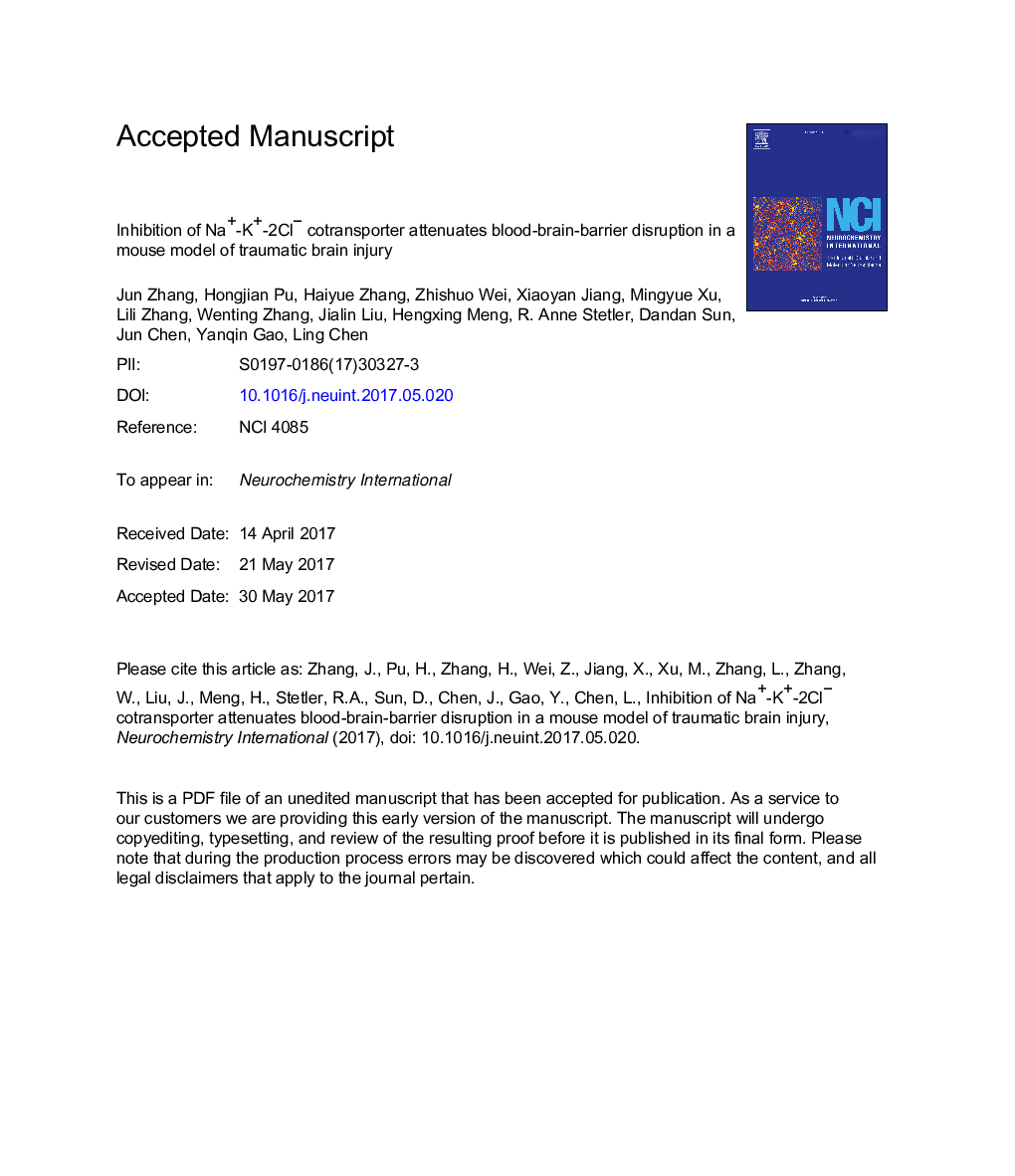| کد مقاله | کد نشریه | سال انتشار | مقاله انگلیسی | نسخه تمام متن |
|---|---|---|---|---|
| 8479020 | 1551264 | 2017 | 26 صفحه PDF | دانلود رایگان |
عنوان انگلیسی مقاله ISI
Inhibition of Na+-K+-2Clâ cotransporter attenuates blood-brain-barrier disruption in a mouse model of traumatic brain injury
دانلود مقاله + سفارش ترجمه
دانلود مقاله ISI انگلیسی
رایگان برای ایرانیان
کلمات کلیدی
NeuNTBIZO-1MMP9NKCCNKCC1CCIMMPGFAPCD31PVDFBSA - BSATraumatic brain injury - آسیب تروماتیک مغزbovine serum albumin - آلبومین سرم گاوTem - این استEvans Blue - ایوانز آبیBumetanide - بومتانییدcluster of differentiation 31 - خوشه تمایز 31BBB - سد خونی مغزیmatrix metalloproteinase - ماتریکس متالوپروتئینازBlood-brain barrier - مانع خون مغزیTransmission electron microscopy - میکروسکوپ الکترونی عبوریZonula occludens-1 - نوار ابزار بسته 1neuronal nuclei - هسته های نورونیGlial fibrillary acidic protein - پروتئین اسیدی فیبریلاسیون گلایالPoly(vinylidene fluoride) - پلی وینیلیدین فلوراید)controlled cortical impact - کنترل قشر مغزی
موضوعات مرتبط
علوم زیستی و بیوفناوری
بیوشیمی، ژنتیک و زیست شناسی مولکولی
بیولوژی سلول
پیش نمایش صفحه اول مقاله

چکیده انگلیسی
Traumatic brain injury (TBI) can lead to long-term motor and cognitive dysfunction, which can be at least partly attributed to blood-brain barrier (BBB) disruption. The mechanisms underlying post-TBI BBB disruption, however, are poorly understood thus far. Na+-K+-2Cl- cotransporter isoform 1 (NKCC1) is a universally expressed ion transporter that maintains intracellular ion homeostasis by increasing intracellular K+ and Clâ. Having been characterized in stroke models, NKCC1 is activated in various cell types in the ischemic brain, and is thought to mediate BBB disruption, brain edema, and neuronal cell death. In this study, we tested the hypothesis that inhibition of NKCC1 may improve neurological outcomes via protecting against BBB disruption in a TBI mouse model. Adult male C57BL/6Â J mice or NKCC1 deficient mice were subjected to controlled cortical impact (CCI). As an alternative to the genetic-based NKCC1 depletion, bumetanide, a selective NKCC1 inhibitor, was administrated (25Â mg/kg, i.p.) 15Â min after CCI and then every 6Â h up to 48Â h. Short-term sensorimotor function recovery was determined by rotarod, cylinder test, grid walking and foot fault test. BBB integrity was examined at 48Â h post-CCI by measuring Evans blue extravasation, brain water content, and expression levels of tight junction proteins. Our results revealed that administration of bumetanide or genetic depletion of NKCC1 improved short-term neurological recovery against TBI. Bumetanide treatment markedly decreased brain water content and BBB leakage, correlated with reduction of MMP-9 expression and preventing the degradation of tight junction proteins. These findings suggest an important role of NKCC1 activation in mediating BBB disruption after TBI. Thus, NKCC1 inhibition may offer the potential for improving neurological outcomes in clinical TBI.
ناشر
Database: Elsevier - ScienceDirect (ساینس دایرکت)
Journal: Neurochemistry International - Volume 111, December 2017, Pages 23-31
Journal: Neurochemistry International - Volume 111, December 2017, Pages 23-31
نویسندگان
Jun Zhang, Hongjian Pu, Haiyue Zhang, Zhishuo Wei, Xiaoyan Jiang, Mingyue Xu, Lili Zhang, Wenting Zhang, Jialin Liu, Hengxing Meng, R. Anne Stetler, Dandan Sun, Jun Chen, Yanqin Gao, Ling Chen,